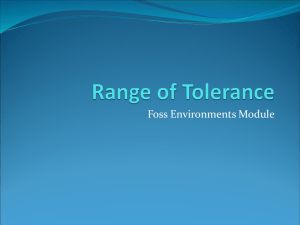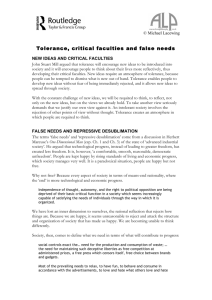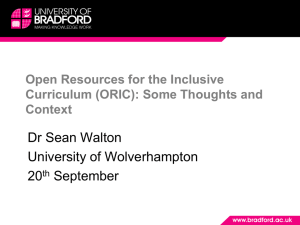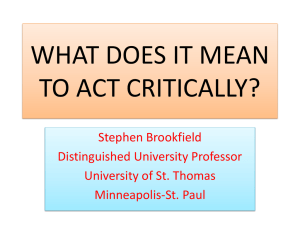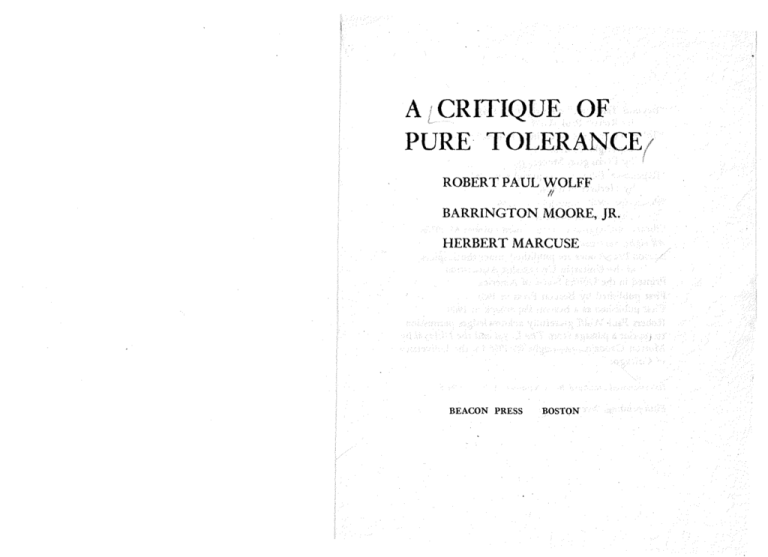
A CRITIQUE OF
PURE· TOLERANCE/
f
ROBERT PAUL WOLFF
II
BARRINGTON MOORE, JR.
HERBERT MARCUSE
BEACON PRESS
BOSTON
CONTENTS
"Beyond Tolerance" copyright © 1965
by Robert Paul Wolff
"Tolerance and the Scientific Outlook"
copyright © 1965
by Barrington Moore, Jr.
"Repressive Tolerance" copyright © 1965
by Herbert Marcuse
"Postscript 1968" copyright © 1969
by Herbert Marcuse
Library of Congress catalogue card number 65-20788
A II rights reserved
Beacon Press books are published under the auspices
of the Unitarian Universalist Association
Printed in the United States of America
First published by Beacon Press in 1965
First published as a Beacon Paperback in 1969
Robert Paul Wolff gratefully acknowledges permission
to reprint a passage from The Loyal and the Disloyal by
Monon Grodzins, copyright © 1956 by the University
of Chicago.
International Standard Book Number: 0-8070-1559-8
Fifth printing, December 1970
Foreword
v
Beyond Tolerance
BY ROBERT PAUL WOLFF
3
Tolerance and the Scientific Outlook
BY BARRINGTON MOORE, JR.
53
Repressive Tolerance
BY HERBERT MARCUSE
81
FOREWORD
THE authors apologize for the title which
they have lightly yet respectfully plagiarized.
Their small book may contain some ideas that
are not alien to Kant. More than modesty makes
us refer to a footnote in the Critique of Pure
Reason: "the 'I think' expresses the act of determining my existence." We like to apply this sentence not as Kant did here to the transcendental
subject only, but also to the empirical one.
The first essay is by a philosopher steeped in
the analytical tradition, an authority on Kant,
and, if interested in social theory and history, allergic to any emanations from the spirit of Hegel.
The last essay is also by a philosopher, an authority on Hegel, who considers the contemporary
analytical tradition dangerous, where it is not
nonsense. The author of the middle essay is a
sociologist trained in a tradition that regarded all
philosophy as absurd and dangerous. That we
have managed to produce a book together is in
itself some small tribute to the spirit of toleration.
Inhabitants of the larger Cambridge academic
community, we often met and as friends passionately argued some of the issues discussed in the
following pages. Some time ago we agreed to set
down our thoughts about tolerance and its place
vi
Foreword
in the prevailing political climate. Though we
have read and pondered one another's writings,
and m~dified our own views according to our
respective degrees of stubbornness, we have not
so~ght in any .way to merge them. The reader
will have no dtfficulty in finding where we disagree.
. On ~he other hand, from very different stanmg pomts and by very different routes, we arrived at just about the same destination. For each
of us the prevailing theory and practice of tolerance turned out on examination to be in varying
de~r~es hyp?~ritical masks to cover appalling
pohttcal reahttes. The tone of indignation rises
sharply from essay to essay. Perhaps vainly, we
hope ~hat readers will follow ·the steps in the
reasonmg that produced this result. There is,
after all, a sense of outrage that arises in the head
as well as the heart.
R.P. W.
B. M.
H.M.
BEYOND TOLERANCE
BY ROBERT PAUL WOLFF
THE virtue of a thing, Plato tells us in the
Republic, is that state or condition which en-
ables it to perform its proper function well. The
virtue of a knife is 'its sharpness, the virtue of a
racehorse its fleetness of foot. So too the cardinal
. virtues of wisdom, courage, temperance, and
justice are excellences of the soul which enable
a man to do well what he is meant to do, viz., to
live.
As each artifact or living creature has its characteristic virtue, so too we may say that each
form of political society has an ideal condition, in
which its guiding principle is fully realized. For
Plato, the good society is an aristocracy of merit
in which the wise and good rule those who are
inferior in talents and accomplishment. The proper distribution of functions and authority is called
by Pla~o "justice," and so the virtue of the Platonic utopia is justice.
Extending this notion, we might say, for example, that the virtue of a monarchy is loyalty,
for the state is gathered into the person of the
king, and the society is bqupd:together by each
subject's personal duty t;Q ·Ilim. The virtue of a
REPRESSIVE TOLERANCE
BY HERBERT MARCUSE
THis essay examines the idea of tolerance
in our advanced industrial society. The conclusion reached is that the realization of the objective of tolerance would call for intolerance
toward prevailing policies, attitudes, opinions,
and the extension of tolerance to policies, attitudes, and opinions which are outlawed or suppressed. In other words, today tolerance appears
· again as what it was in its origins, at the beginning of the modern period-a partisan goal, a subversive liberating notion and practice. Conversely, what is proclaimed and practiced as tolerance
today, is in many of its most effective manifestations serving the cause of oppression.
The author is fully aware that, at present,. no
power, no authority, no government exists which
would translate liberating tolerance into practice, but he believes that it is the task and duty of
the intellectual to recall and preserve historical
possibilities which seem to have become utopian
possibilities-that it is his task to break the concreteness of oppression in order to open the menThis essay is dedicated to my students at; Brandeis
University.
82
Repressive Tolerance
tal space in which this society can be recognized
as what it is and does.
Tolerance is an end in itself. The elimination
of violence, and the reduction of suppression to
the extent required for protecting man and animals from cruelty and aggression are preconditions for the creation of a humane society. Such
a society does not yet exist; progress toward it is
perhaps more than before arrested by violence
and suppression on a global scale. As deterrents
against nuclear war, as police action against subversion, as technical aid in the fight against imperialism and communism, as methods of pacification in neo-colonial massacres, violence and
suppression are promulgated, practiced; ·:md defended by democratic and authoritarian governments alike, and the people subjected to these
governments are educated td sustain such practices as necessary for the preservation of the
status quo. Tolerance is extended to policies,
conditions, and modes of behavior which should
not be tolerated because they are impeding, if
not destroying, the chances of creating an existence without fear and misery.
- This sort of tolerance strengthens the tyranny
of the majority against which authentic liberals
protested. The political locus of tolerance has
changed: while it is more or less quietly and constitutionally withdrawn from the opposition, it
is made compulsory behavior with respect to
established policies. Tolerance is turned from an
active into a passive state, from practice to nonpractice: laissez-faire the constituted authorities.
Herbert Marcuse
83
It is the people who tolerate the government,
which in turn tolerates opposition within the
framework determined ?Y the constituted
authorities.
Tolerance toward that which is radically evil
now appears as good because it serves the cohesion of the whole on the road to affluence or
more affluence. The toleration of the systematic
moronization of children and adults alike by
publicity and propaganda, the release of d~struc­
tiveness in aggressive driving, the recruitment
for and training of special forces, the impotent
and benevolent tolerance toward outright deception in merchandising, waste, and planned obsolescence are not distortions and aberrations,
they are the essence of a system which fosters
tolerance as a means for perpetuating the struggle for existence and suppressing the alternatives.
The authorities in education, morals, and psychology are vociferous against the incr~ase in
juvenile delinquency; they are less vociferous
~gainst the proud presentation, in word an~ d.eed
and pictures, of ever more powerful missiles,
rockets, bombs--the mature delinquency of a
whole civilization.
According to a dialectical propositton it is
the whole which determines the truth-not in
the sense that the whole is prior or superior
to its parts, but in the sense that i~s structure
and function determine every particular condition and relation. Thus, within a repressive
society, even progressive movements threaten
to turn into their opposite to the degree to
which they accept the rules of the game. To take
84
Repressive Tolerance
a most controversial case: the exercise of political rights (such as voting, letter-writing to the
press, to Senators, etc., protest-demonstrations
with a priori renunciation of counterviolence)
in a society of total administration serves to
strengthen this administration by testifying to
the existence of democratic liberties which, in
reality, have changed their content and lost
their effectiveness. In such a case, freedom (of
opinion, of assembly, of speech) becomes an instrument for absolving servitude. And yet (and
only here the dialectical proposition shows its
full intent) the existence and practice of these
liberties remain a precondition for the restoration
of their original opposit.ional function, provided
that the effort to transcend their (often self-imposed) limitations is intensified. Generally, the
function and value of tolerance depend on the
equality prevalent in the society in which tolerance is practiced. Tolerance itself stands subject
to overriding criteria: its range and its limits cannot be defined in terms of the respective society.
In other words, tolerance is an end in itself only
when it is truly universal, practiced by the rulers
as well as by the ruled, by the lords as well as by
the peasants, by the sheriffs as well as by their
victims. And such universal tolerance is possible
only when no real or alleged enemy requires in
the national interest the education and training
of people in military violence and destruction. As
long as these conditions do not prevail, the conditions of tolerance are "loaded": they are determined and defined by the institutionalized inequality (which is certainly compatible with
Herbert Marcuse
85
constitutional equality), i.e., by the class structure of society. In such a society, tolerance is
de facto limited on the dual ground of legalized
violence or suppression (police, armed forces,
guards of all sorts) and of the privileged position
held by the predominant interests and their "connections."
These background limitations of tolerance are
normally prior to the explicit and judicial limitations as defined by the courts, custom, governments, etc. (for example, "clear and present
danger," threat to national security, heresy).
Within the framework of such a social structure,
tolerance can be safely practiced and proclaimed.
It is of two kinds: ( 1) the passive toleration of
.entrenched and established attitudes and ideas
even if their damaging effect on man and nature
is evident; and ( 2) the active, official tolerance
granted to the Right as well as to the Left, to
movements of aggression as well as to movements
of peace, to the party of hate as well as to that of
humanity. I call this non-partisan tolerance "abstract" or "pure" inasmuch as it refrains from
taking sides-but in doing so it actually protects
the already established machinery of discrimination.
The tolerance· which enlarged the range and
content of freedom was always partisan-intolerant toward the protagonists of the repressive
status quo. The issue was only the degree and
extent of intolerance. In the firmly established
liberal society of England and the United States,
freedom of speech and assembly was granted
even to the radical enemies of society, provided
86
Repressive Tolerance
th~y did not make the transition from word to
deed, from speech to action.
Relying on the effective background limitations imposed by its class structure, the society
seemed to practice general tolerance. But liberalist theory had already placed an important condition on tolerance: it was "to apply only to
human beings in the maturity of their fadilties."
John Stuart Mill does not only speak of children
and minors; he elaborates: "Liberty, as a principle, has no application t-o any state of things
anterior to the time when mankind have become
capable of being improved by free and equal
discussion." Anterior to that time, men may
still be barbarians, and "despotism is a legitimate
mode of government in dealing with barbarians,
provided the end be their improvement, and the
means justified by actually effecting that end."
Mill's often-quoted words have a less familiar
implication on which their meaning depends:
the internal connection between liberty arlH
truth. There is a sense in which truth is the end
of liberty, and liberty must be defined and confined by truth. Now in what sense can liberty
be for the sake of truth? Liberty is self-determination, autonomy-this is almost a tautology,
but a tautology which results from a whole series
of synthetic judgments. It stipulates the ability
to determine one's own life: to be able to determine what to do and what not to do, what to
suffer and what not. But the subject of this autonomy is never the contingent, private individual as that which he actually is or happens to be;
Herbert Marcuse
87
it is rather the individual as a human being who is
capable of being free with the others. And the
problem of making possible such a harmony between every individual liberty and the other is
not that of finding a compromise between competitors, or between freedom and law, between
general and individual interest, common and private welfare in an established society, but of
creating the society in which man is no lemger
enslaved by institutions which vitiate self-determination from the beginning. In other words,
freedom is still to be created even for the freest
of the existing societies. And the direction in
which it must he sought, and the institutional
and cultural changes which may help to attain
the goal are, at least in developed civilization,
comprehensible, that is to say, they can be identified and projected, on the basis of experience,
by human reason.
In the interplay of theory and practice, true
and false solutions become distinguishablenever with the evidence of necessity, never as
the positive, only with the certainty of a reasoned and reasonable chance, and with the persuasive force of the negative. For the true positive is the society of the future and therefore
beyond definition and determination, while the
existing positive is that which must be surmounted. But the experience and understanding of the
existent society may well be capable of identifying what is not conducive to a free and rational
society, what impedes and distorts the possibilities of its creation. Freedom is liberation, a spe-
88
1
Herbert Marcuse
Repressive Tolera12ce
cific historical process .in theory and practice,
and as such it has its right and wrong, its truth
and falsehood.
The uncertainty of chance in this distinction
does not cancel the historical objectivity, but it ...
necessitates freedom of thought and expression
as preconditions of finding the way to freedomit necessitates tolerance. However, th:-,·tolerance
cannot be indiscriminate and equal ~th respect
to the contents of expression, neither in word
nor in deed; it cannot prt>tect false words and
wrong deeds which demonstrate that they contradict and counteract the possibilities of liberation. Such indiscriminate tolerance is justified in
harmless debates, in conversation, in academic
discussion; it is indispensable in the scientific enterprise, in private religion. But society cannot
be indiscriminate where the pacification of existence, where freedom and happiness themselves
are at stake: here, certain things cannot be said,
certain ideas cannot be expressed, certain policies
cannot be proposed, certain behavior cannot be
permitted without making tolerance an instrument for the continuation of servitude.
The danger of "destructive tolerance" (Baudelaire), of "benevolent neutrality" toward art
has been recognized: the market, which absorbs
equally well (although with often quite sudden
fluctuations) art, anti-art, and non-art, all possible conflicting styles, schools, forms, provides a
"complacent receptacle, a friendly abyss" (Edgar Wind, Art and Anarchy (New York:
Knopf, 1964), p. 101) in which the radical impact of art, the protest of art against the estab-
I
\
(
'f
l
l
89
lished reality is swallowed up. However, censorship of art and literature is regressive under all
circumstances. The authentic oeuvre is not and
cannot be a prop of oppression, and pseudo-art
(which can be such a prop) is not art. Art stands
against history, withstands history which has
been the history of oppression, for art subjects
reality to laws other than the established ones: to
the laws of the Form which creates a different
reality-negation of the established one even
where art depicts the established reality. But in
its struggle with history, art subjects itself to
history: history enters the definition of art and
ent~rs into the distinction between art and
pseudo-art. Thus it happens that what was once
art becomes pseudo-art. Previous forms, styles,
and qualities, previous modes of protest and refusal cannot be recaptured in or against a different society. There are cases where an authentic
oeuvre carries a regressive political messageDostoevski is a case in point. But then, the message is canceled by the oeuvre itself: the regressive political content is absorbed, aufgehoben in
the artistic form: in the work as literature.
Tolerance of free speech is the way of improvement, of progr.ess in liberation, not because
there is no objective truth, and improvement
must necessarily be a compromise between a
variety of opinions, -~~~re~lLQ~.:_ <;;~-­
j!!~-~!Ll!!~IL~hi£!L.-CEJ:!l be .discovered, ascertained only in learning a;;:~r<:;;;Tipreh~i'iding that
which is and that which can be and ought to be
done for the sake of improving the lot of mankind. This common,and historical "ought" is not
Repressive
90
r"-
Tole.~'lnce
immediately evident, at hand: it has to be uncovered by "cutting through," "splitting,"
"breaking asunder"· ( dis-cutio) t'he giveh material-separating right and wrong, good and bad,
correct and incorrect. The subject whose "improvement" depends on a progressive historical
practice is each man as man, and this universality
is reflected in that of the discussion, which a
priori does not exclude any group or individual.
But even the all-inclusive character of liberalist
tolerance was, at least in theory, based on the
proposition that men were (potential) individuals who could learn to hear and see and feel by
themselves, to develop their own thoughts, to
grasp their trite interests and rights and capabilities, also agains,£_esta~lished auth()~i!L~ni.QQ:. This was the rationale of free. speech and assembly. !Jniver~Lt:~_leration bec?Il1es q~estion­
able when its rationale.. longer p~ey~ils,~fien
foleranceis.a<llliiiii'srerea to~~dandJn-
no
42££!1i~ited 125!Iii4~alswho parrot~ a_~i.~~~n,
th~.2Pil}~()l!.<>tlh~I~:~!l~.t~~"f,Tor whom heteronomy has become autonomy.
The telos of tolerance is truth. It is clear from
the historical record that the ~~thentic spokesmen of tolerance had more and other truth in
j!jL~fiilan th;;· o{ p;~P;;(i~~;;t-iogi~";~rl··;~~demic theory. John. Stuart Mill speaks of the
truth which is persecuted in history and which
does not triumph over persecution by virtue of
its "inherent power," which in fact has no inherent power "against the dungeon and the stake."
' And he enumerates the "truths" which were
cruelly and successfully liquidated in the dun-
Herbert Marcuse
91
geons and at the stake: that of Arnold of Brescia,
of Fra Dolcino, of Savonarola, of the Albigensians, Waldensians, Lollards, and Hussites. Tolerance is first and foremost for the sake ~e
heretics-the historical road toward humanttas
;qlpeais~ as heresy: target of persecution by the
powers that be. Heresy by itself, however, is no
token of truth.
The criterion of progress in freedom according to which Mill judges these movements is the
Reformation. The evaluation is ex post, and his
list includ'es opposites (Savonarola too would
have burned Fra Dolcino). Even the ex post
evaluation is contestable as to its truth: history
corrects the judgment-too late. The correction
does not help the victims and does not absolve
their executioners. However, the lesson is clear:
i,m:olerance has delayed progress and has ~a­
longed the..slaughter and torture of innocents for \
h~nd~~~-gf_years. Does this clinch the case for)
indiscriminate, "E!!rt;" tolera!!ce? Are there historical conditions in which ~h toleration
-.}:!edes liberatiQ.Q. and multiplies the victims who \
are sacrificed to the status quo? .,Can the indis- (
.cr~ranty of political rights and li~r­
..ties be r~ressive? Can such tolerance serve to
contain quaiTtatlve social change?
I shall discuss this question only with refer- ~
ence to political movements, attitudes, schools. of
thought, philosophies which are "p.Qliti~~l" in
the widest sense-affecting the societJ·asa-whole,
demonstrably transc~ndin_g_tb,e_.sphere of priva, cy. Moreover, I propose a shift in the focus of
the discussion: it will be concerned not only, and
y--~-~'~""'"~--'"''""'~~-~~~-=--~---~~>---Y-'-'-">-~--~--~...._-~.,_-~. ~
i,w.:-\
1r6
I
92
Repressive Tolerance
not primarily, with tolerance toward radical extremes, minorities, subversives, etc., but rather
with tolerance toward rna· orities, toward official
~:ul<:Lp!!.!?lk__Q~~-~~I<!..!h_~-~l!tlu.s~ ecCpro_!_~£.t.<:>E~_<:>f_f!"~~p?m. In this case, the discussion
can have. as a frame of reference only a democratic society, in which the people, as individuals
and as members of political and other organizations, participate in the making, sustaining, and
changing policies. In an authoritarian system, the
people do not tolerate-they suffer established
policies.
Under a system of constitutionally guaranteed
and (generally and without too many and too
glaring exceptions) practiced civil rights and
liberties, o~sition and dissent are tol~n­
tess they_ issue in vio~nce and/or in exhortation
t~l!~.T~ization of violent subversion. The
underlying assumption is that the establisfied society is free, and that any improvement, even a
change in the social structure and social values,
would come about in the normal course of
events, prepared, defined, and tested in free and
equal discussion, on the open marketplace of
ideas and goods.* Now in recalling John Stuart
* I wish to reiterate for the following discussion that,
de facto, tolerance is not indiscriminate and "pure" even
in the most democratic society. The "background limitations" stated on page 85 restrict tolerance before it begins to operate. The antagonistic structure of society
rigs the rules of the game. Those who stand against the
established system are a priori at a disadvantage, which
is not removed by the toleration of their ideas, speeches,
and newspapers.
I
Il
l
I
Herbert Marcuse
93
Mill's passage, I drew attention to the premise
hidden in this assumption: free and e~al discus-·-\
s\mtcan fulfill the functionattnbmed to""1i"only (
iLitJs nifiqn_ai~~~i5,§!21!~~~~-~~~~~!()£~erit of ·
free from
ma!!!E~!-~!i<:>!l-'--~~E~ne~us
notion ~-­
of Fil!!;t_li~lJ1and counte!VaiTliig)owers isnosubstitute for this requirement. One might in theory
construct a state in which a multitude of different pressures, interests, and authorities balance
each other out and result in a truly general and
rational interest. However, such a construct badly fits a society in which powers are and remain
unequal and even increase their unequal weight
when they run their own course. It fits even
worse when the variety of pressures unifies and
coagulates into an overwhelming whole, integrating the particular countervailing powers by
virtue of an increasing standard of living and an
increasing concentration of power. Then, the
laborer, whose real ·interest conflicts with that
of management, .the common consumer whose
real interest conflicts with that of the producer,
the intellectual whose vocation conflicts with
that of his employer find themselves submitting
to a system against which they are powerless and
appear unreasonable. The ideas of the available
alternatives evaporates into an utterly utopian
dimension in which it is at home, for a free society ·is indeed unrealistically and undefinably
different from the existing ones. Under these
circumstances, whatever improvement may occur "in the normal course of events" and with-
il.l_<!~p~Q~:}_~gLthi~~·
indoctri~Iion, ?
?u-thorliy:--rlie.
Repressi'l./e Tolerance
94
out subversion is likely to be improvement in
. ;~;:~-direction dete!:mined by the ~icular in~~r­
-."";;::::c>ests which control the whole.
·-By -the same token,-those. ~inoriti~s which
strive for a change of the whole Itself will, under
optimal conditions which rarely prevail, be left
free to deliberate and discuss, to speak and to
assemble-and will be left harmless and helpless
in the face of the overwhelming majority, which
militates against qualitative social change. This
/majority is firmly grounded in t~e increasing
satisfaction of needs, and technological and mental coordination, which testify to the general
helplessness of radical groups in a well-functioning social system.
Within the affluent democracy, the affluent
discussion prevails, and within the established
framework, it is tolerant to a large extent. All
points of view can be heard: the ~ommunist a?d
the Fascist, the Left and the Rtght, the whtte
and the Negro, the crusaders for armament and
for disarmament. Moreover, in endlessly dragging debates over the media, the stup~d op~nion
is treated with the same respect as the mtelhgent
one, the misinformed may talk as long as the informed, and propaganda rides along with education, truth with falsehood. Tilis.J~!!~ra­
.tiQ..Il..Of sense !!ruL!!onsense is justi~ed by ~e
democratic argument that nobody, neither group
~ocindividual, is in ~o~ssig_n of the truth and
~ore--ofahnm what is ri ht ~nd ~r~,
~oo2_~nd_bad: There~?re, all con~estm~ opn~tons
must be submitted to the people for Its dehber-.
ation and choice. But
I have already suggested
.e::·
c;:
Herbert Marcuse
95
that the democratic argument implies a necessary
condition, namely, that the people must be capable of deli.berating and choosing on the basis of
knowledge, that th~_ m~~~.J2ave acce~s to _~m­
thentic information; and that, on this basis, their
~~~luatiori·····must: oe··me-:result--or ·a:monomous
ti}Q~ght: . .
·
Iri the contemporary ·period, the· democratic
argument for abstract tolerance tends to be invalidated by the invalidation of the democratic
process itself. The liberating force of democracy
was the chance it gave to effective dissent, on the
individual as well as social scale, its openness to
qualitatively different forms of government, of
culture, education, work-of the human existence in general. The toleration of free discussion
and the equal right of opposites was to define
and clarify the different forms of dissent: their
direction, content, prospect. 13_ut with_!.ll~-f£~
centrati.Q!L~i.~~?.E_9~ic and political power and
-~-i.!l.~~g'E_~!ion of opposites in a societ~lch
uses technology as an mstrume~nati(Yn,
effective dissentlsbl0c~11Cfe it coUIOfreely
~mer~ in._!;he formation of opinior;. it;!_~~a­
tiQ.uand. commun_JS~.._m_sp~i.!;handassemDfy.
Under the rule of monopolistic media-themselves the mere instruments of economic and political power-a mentality is created for which
right and wrong, true and false are predefined
wherever they affect the vital interests of the society. This· is, prior to all expression and communication, a matter of semantics: the blocking
of effective dissent, of the recognition of that
~his;;__b_j~_!!Q.~--~f the Establlslll:nem-whlclioegms
- - - - - - -•.._--~......_,._,_,.. _________ ,___.~<-·~-__...._. __~-----
96
Repressive Tolerance
2_~--~~-:_}~_~g~~g~--~!!~!- is publicized ~~~-:l_~!!li~~s­
tere~~ The meaning of wOrdsisrigidly stabilized.
Rational persuasion, persuasion to the opposite is
all but precluded. The avenues of entrance are
dosed to the meaning of words and ideas other
than the established one-established by the publicity of the powers that be, a.nd verified in their
practices. Other words can be spoken and heard,
other ideas can be expressed, but, at the massive
scale of the conservative majority (outside such
enclaves as the intelligentsia), they are immediately "evaluated" (i.e. automatically understood)
in terms of the public language-a language
which determines "a priori" the direction in
which the thought process moves. Thus the
process of reflection ends where it started: in
the given conditions and relations. Self-validating, the argument of the discussion repels the
contradiction because the antithesis is redefined
in terms of the thesis. For example, thesis: we
work for peace; antithesis: we prepare for war
(or even: we wage war) ; unification of oppti>sites: preparing for war is working for peace.
Peace is redefined as necessarily, in the prevailing situation, including preparation for war (or
even war) and in this Orwellian form, the meaning of the word "peace" is stabilized. Thus, the
basic vocabulary of the Orwellian language operates as a priori categories of understanding:
preforming all content. ~e conditions invalida~__t_!le.-}Qgic of tolerance ;}Ucfi involves the
rational development of me~n~~_gg_pr~_c;ludes
the_£J9ii_f.i:g_()_(meaninf--Consequently, persuasion through discussion and the equal presenta-
Herbert Marcuse
97
tion of dpposites (even where it is really equal)
easily lose their liberating force as factors of understanding and learning; they are far more
likely to strengthen the established thesis and to
repel the alternatives.
Impartiality to the utmost, equal treatment of
competing and conflicting issues is indeed a basic
requirement for decision-making in the democratic process-it is an equally basic requirement
for defining the limits of tolerance. But in a de~~cracy with totalitarian organization, ()!>}<!~­
tivity m::ty_fulfill a very different function, name1y, t()Joster a mental attitude which tends to obliter.~t~~th~ --··----~-~~--ditre:renceoaween-·irue·ani:rialse '
-~------·-
inJormatiorr~nd inQ.()_£tr1n~Ion;nglitandwnmg.
In fact,. the -~e~ision betweenoppose<roplllions
has been made before the presentation and discussion get under way-made, not by a conspiracy or a sponsor or a publisher, not by any dictatorship, ~-_!ather by the '~110!!!la!_course of
~events," which is the course of admiru5tered
.
events, ~~-~-~~l. the mentality shaped in..........
this
.
.£__our~e. H ere, too, It Is the whole wnich determines the truth. Then the decision asserts itself
without any open violation of objectivity, in'
such things as the make-up of a newspaper (with
the breaking up of vital information into bits
interspersed between extraneous material, irrelevant items, rele ating. of some radically negative
.n~:w..~tQ. .~l1()___~~~~J~-~-~~e , in t e JUX~TtiOn of
gorg_@us _!!.!is :with _1!!!fllit_~~~fl__ horrors~--~ii-The
·-·---·~--
---~-~~-·----··-·--·---c·-·-·----·
lt~trq9!!.<:~an<l intermR!i.9JL<:>.fi!i~~hro~dcast­
.
.iitg of t~~§ !>Y..9-~~~h~!!'i!

